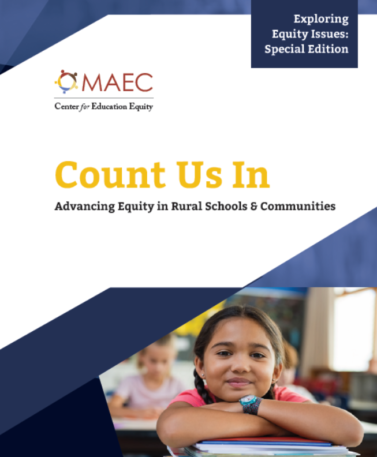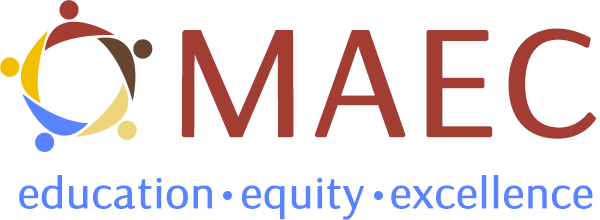
In January 2020, MAEC began planning its annual Equity Institute with a focus on advancing equity for rural schools and communities. Rurality, as it is not legally a protected class, is often left out of conversations about civil rights and equity. However, clear intersections connect rurality with poverty, racism, religious intolerance, gender-based discrimination, and nationality-based hostility. Rural communities experience obstacles to expanding opportunity and achievement due to lack of access to high-quality child care and K-12 educational opportunities, barriers to healthcare and mental health supports, and viable employment opportunities. The COVID-19 pandemic forced MAEC and its Equity Institute partners, the Office for Civil Rights Philadelphia Office, West Virginia University, and McAndrews Law Office, to postpone the on-site event.
As the United States witnesses the impact of COVID-19 on rural communities–the deepened digital divide, lost jobs at the plants and factories economically anchoring rural communities, closed hospitals or unreachable health care services, greater food insecurity for children not receiving meals at schools–the need for rural conversation seems more important than ever. To continue the conversation, MAEC compiled a series of essays, articles, and research to tackle the question: how do we, as a society, value and support rural students and families? Thus this special edition of Exploring Equity Issues was born.
The rural community understands that the solutions needed in rural areas are inherently singular and will not likely come from transplanted metropolitan solutions. They will emerge through community innovation and local human talent and vision; and these solutions will only take root if they are supported by equity-based, systemic, and sustained national and state-level resources. This series seeks to paint a picture of a few of the many dimensions that characterize rural America. By exploring intersecting rural identities and challenges, we can see how the lived experiences and unique strengths of rural students enriches our educational system and our communities.
Download Count Us In: Advancing Equity in Rural Schools and Communities
Table of Contents
Gaining Ground on Equity for Rural Schools and Communities
MAEC’s Dr. Heather Biggar Tomlinson contextualizes the unique challenges and strengths that characterize rural communities and education in the United States. She examines racial diversity, poverty, intersecting discrimination, resource allocation for schools, broadband connectivity, access to high-quality child care, health services, and other topics impacting families in rural areas.
Student’s Perspective: Is There Room for Us at the Table? Being a College Student in Appalachia
Cassie Conklin, a freelance journalist and college student in Appalachian Maryland, breaks down the difficulties of attending college in rural America. Her essay explores four dimensions: feeling the “otherness” and distance as a rural student; the lack of student involvement in university decision-making; what it means to be a non-traditional student at a rural college; and the impact of inadequate child care and health care.
Reimagining the “New Normal”: Equity, Policy, COVID, and Rural Public Schools
Arnold Fege, President of the Public Advocacy for Kids nonprofit, reflects on what it takes to create equity and reimagine schooling in rural communities after COVID-19. His article centers around five questions: unpacking the United States’ political will to resolve internet inequality; examining organizational changes needed to wholly care for students; identifying effective strategies to retain educators; looking to the relationship between federal funding and success in rural education; and predicting the role of state education agencies in providing school resources.
Practitioner’s Perspective: Newcomers and English Learners Living in Small Town America
Amanda Ensor, a Title I Family Engagement Specialist for Queen Anne’s County Public Schools, shares how a school in Sudlersville, Maryland, implements a family-school partnership program to welcome newcomer families in a one-stop-light town on Maryland’s Eastern Shore. The community-based, school- and partner-sponsored program has positively impacted English Learner students and families and teachers from all backgrounds.
Equity and Expectations: Leading Rural Communities through Unprecedented Pressures
Dr. McHenry-Sorber’s and Dr. Hall Sutherland’s study on rural schools in South Carolina, West Virginia, and Vermont is one of the first of its kind to explore the ways rural leaders implement state equity policies in their schools. Drawing on their expertise as rural scholars, they examine strategies, strengths, and challenges for rural community leaders to respond to issues of race, economic inequality, and immigration.
When Pandemic Meets Endemic: Injustice in Our Rural Homes
Director J. Spenser Darden from West Virginia University clearly outlines how racism and placism intersect to make life more difficult for people of color who live in rural areas. He breaks down the direct impact of historic racist policies and ideas on the ways different groups of people are treated in the United States, and describes how placist ideas have magnified the global pandemic for rural communities of color. His article includes interview excerpts from his conversations with “Justin” (not his real name), a Black student at WVU.
Growing Up Rural: Inequity for Young Children and Child Care Providers
In their research- and narrative-filled article, Dr. Beverly Boals Gilbert and Dr. Cathy Grace call for action in providing resources to people living in the rural Mississippi Delta. Dr. Grace draws from personal stories growing up and teaching in rural Arkansas, describing the moment she recognized her own learning gaps, the impact of the district’s decision not to integrate schools, and what it was like teaching students without the necessary tools. The authors also draw from other personal stories, including responses from child care professionals who are struggling during COVID-19 closures.
Parent’s Perspective: Living Through Spring 2020 in Rural America
Kristy Brengle balanced a full-time job and full-time teaching when her sons were sent home this spring due to the pandemic. What started as a temporary stay-at-home mandate turned into cutting back her professional hours, supporting her kindergartener and third grader in their classes, and taking care of her infant out of daycare. In Kristy’s essay, she describes the challenges she faced due to lack of broadband, competing priorities, and difficulty dedicating her time to work.
This collection was conceived and edited by Heather Biggar Tomlinson, Ph.D., Senior Specialist for Early Childhood and Family Engagement at MAEC. We greatly appreciate the contributions from all of the authors.

